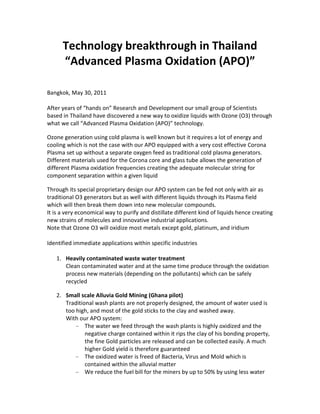Advanced Plasma Oxidation - Thailand
- 1. Technology breakthrough in Thailand ŌĆ£Advanced Plasma Oxidation (APO)ŌĆØ Bangkok, May 30, 2011 After years of ŌĆ£hands onŌĆØ Research and Development our small group of Scientists based in Thailand have discovered a new way to oxidize liquids with Ozone (O3) through what we call ŌĆ£Advanced Plasma Oxidation (APO)ŌĆØ technology. Ozone generation using cold plasma is well known but it requires a lot of energy and cooling which is not the case with our APO equipped with a very cost effective Corona Plasma set up without a separate oxygen feed as traditional cold plasma generators. Different materials used for the Corona core and glass tube allows the generation of different Plasma oxidation frequencies creating the adequate molecular string for component separation within a given liquid Through its special proprietary design our APO system can be fed not only with air as traditional O3 generators but as well with different liquids through its Plasma field which will then break them down into new molecular compounds. It is a very economical way to purify and distillate different kind of liquids hence creating new strains of molecules and innovative industrial applications. Note that Ozone O3 will oxidize most metals except gold, platinum, and iridium Identified immediate applications within specific industries 1. Heavily contaminated waste water treatment Clean contaminated water and at the same time produce through the oxidation process new materials (depending on the pollutants) which can be safely recycled 2. Small scale Alluvia Gold Mining (Ghana pilot) Traditional wash plants are not properly designed, the amount of water used is too high, and most of the gold sticks to the clay and washed away. With our APO system: - The water we feed through the wash plants is highly oxidized and the negative charge contained within it rips the clay of his bonding property, the fine Gold particles are released and can be collected easily. A much higher Gold yield is therefore guaranteed - The oxidized water is freed of Bacteria, Virus and Mold which is contained within the alluvial matter - We reduce the fuel bill for the miners by up to 50% by using less water
- 2. - The oxidized material left over after Gold extraction can be used to build roads, fish ponds (fish thrive in oxidized water; proven in our Malaysia pilot farms) chicken huts whatever may be suitable for the community to relay on when the mine is depleted 3. Jatropa Oil http://www.jatrophabiodiesel.org/aboutJatrophaPlant.php processed with our APO can be used directly in diesel engines. Note: used motor oil recycling would be another close field of development 4. Coal can be grinded into powder, mixed into specially charged water and then cracked by the APO system where minerals and oils within the coal could be separated and extracted. Further detailed R&D need to be made but we have the Technological ŌĆ£entry doorŌĆØ We are seeking transparent win-win Global or Regional partners interested in developing a long term and mutually beneficial way forward. Detailed Business plan presentation, technical discussion and visual demonstration using pilot units (located in both Thailand & Ghana) can be organized on very short notice A sustainable application of ŌĆ£Corporate Social ResponsibilityŌĆØ is essential within our Business model with all related stakeholders being involved in local Community support Contact: AdvancedPlasmaOxidation@gmail.com


